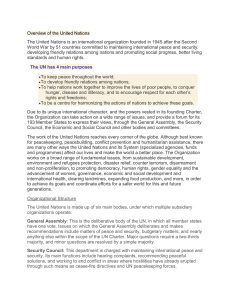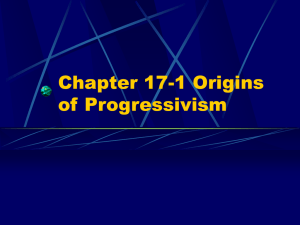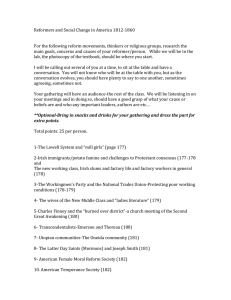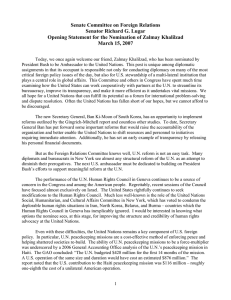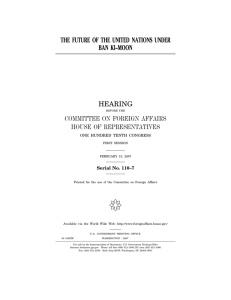Testimony of Senator George Mitchell Co-Chairman Task Force on the United Nations
advertisement
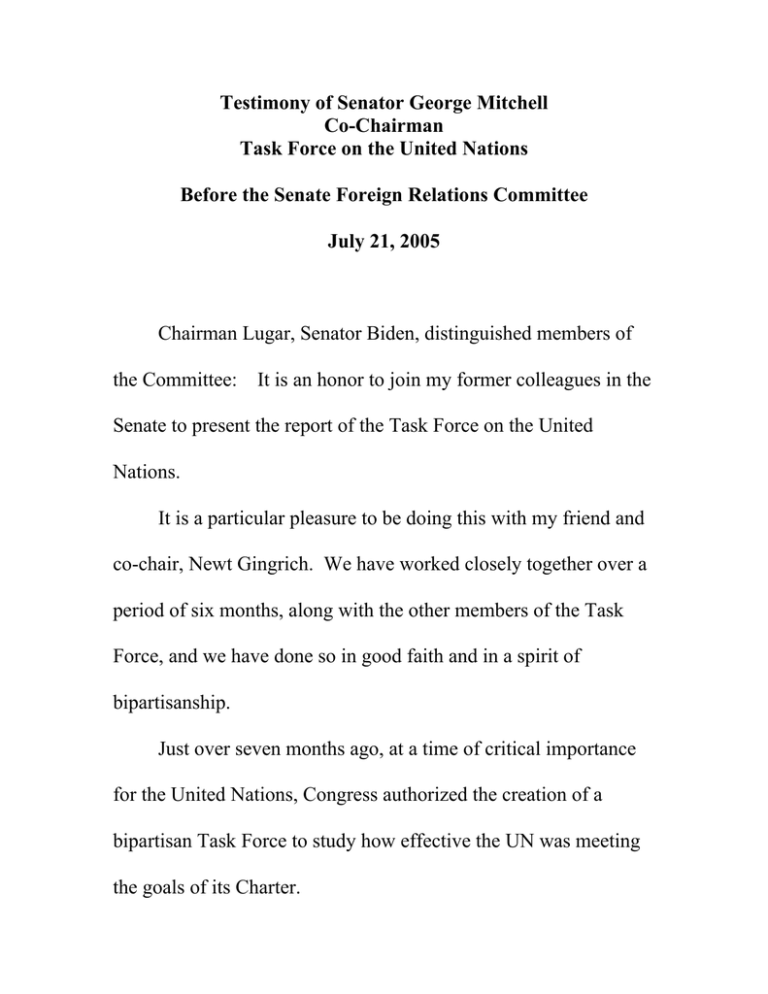
Testimony of Senator George Mitchell Co-Chairman Task Force on the United Nations Before the Senate Foreign Relations Committee July 21, 2005 Chairman Lugar, Senator Biden, distinguished members of the Committee: It is an honor to join my former colleagues in the Senate to present the report of the Task Force on the United Nations. It is a particular pleasure to be doing this with my friend and co-chair, Newt Gingrich. We have worked closely together over a period of six months, along with the other members of the Task Force, and we have done so in good faith and in a spirit of bipartisanship. Just over seven months ago, at a time of critical importance for the United Nations, Congress authorized the creation of a bipartisan Task Force to study how effective the UN was meeting the goals of its Charter. In a very compressed time frame, Task Force members and experts have produced a very comprehensive report. The report is based on fact finding missions by Task Force members, including visits to peacekeeping operations and humanitarian missions in the field, and meetings with the UN leadership in Geneva and New York. The full Task Force also met in plenary session for two all-day sessions in Washington. The experts who worked with Task Force members represent great breadth and depth of knowledge, reflecting the fact that they come from six of the nation's leading public organizations: the American Enterprise Institute, the Brookings Institution, the Center for Strategic and International Studies, the Council on Foreign Relations, the Heritage Foundation and the Hoover Institution. I would especially like to acknowledge and thank Lee Feinstein of the Council on Foreign Relations and William Sanders of the American Enterprise Institute for their knowledge of this subject and substantive contributions to this report. 2 As the report states, this is a consensus document. Twelve experienced, knowledgeable citizens inquired, debated, discussed. We agreed on most of the issues but not all. Obviously, each member has the right to express his or her individual views, beyond what is not set forth in the report. We have come together to do what we can to help the United Nations realize more fully the aims of its Charter. Our mandate was to recommend an actionable agenda for UN reform. We were asked to address this subject solely from an American perspective, and we have done so. We have carried out this mandate in the firm belief that an effective UN is in American interests and indeed that is the first and most fundamental conclusion of our Task Force. Americans have always hoped and wanted the United Nations to play a major role in the pursuit of a better world. 3 Yet, recent events have challenged the UN and its members, including the United States, to adapt to dramatically different demands: the problem of failed states, catastrophic terrorism, the need for effective action to prevent genocide, and the promotion of democracy and the rule of law. The Task Force concluded that reform is necessary on two levels. The first is institutional change, without which other reforms will be much more difficult to implement. Institutional reform is not a favor to the United States; it is vital to the continued integrity and vitality of the UN itself. In this regard, the Task Force notes that it undertakes this effort at a time of growing consensus on the imperative for reform at the United Nations, and in light of important reports on reform by the High-Level Panel on Threats, Challenges, and Change, and the Secretary General’s own report, “In Larger Freedom.” The Task Force found that management systems that are common in other public and private institutions were lacking in a number of UN agencies and bodies we reviewed. 4 We recommended a reform program that includes a number of elements. Among these are: • An authoritative Independent Oversight Board that will have all the authority of an independent audit committee; • Empowerment of the Secretary General to replace top officials and the creation of an effective Chief Operating Officer and modern personnel system; • Effective whistleblower protection, and ethics and disclosure standards for top officials, and transparency. • Sunset provisions for all programs and activities mandated by the General Assembly; and • Identification of operational programs that should be funded entirely by voluntary contributions. With respect to peacekeeping, the Task Force reviewed the disturbing allegations of sexual exploitation and abuse by UN peacekeepers in the Congo and elsewhere. We recommended immediate implementation of a policy of zero tolerance, better training, and other disciplinary and preventive measures. 5 We also recommended that the Department of Peacekeeping Operations (DPKO) become a more independent program with distinct rules and regulations appropriate for its operational responsibility for comprehensive peacekeeping missions. The second kind of reform is operational. Nowhere is this more important than in crafting an effective strategy and identifying specific measures to improve the UN’s capacity to stop genocide, mass killings and human rights violations, including immediate action on Darfur. On Darfur, the Task Force recommended a series of immediate initiatives, for the United States, the UN, and others to assist the African Union in stopping the killing. Our recommendations include assembling a package of assistance for the African Union; authorization and establishment of a no-fly zone over Darfur; and a new Security Council resolution that provides a strong mandate, backed up by the forces adequate to the mission. 6 The Task Force also discussed genocide prevention more generally. One of the task force’s most important conclusions, I believe, is its affirmation of every government’s responsibility to protect its citizens and those within its jurisdiction from genocide, mass killing, and massive and sustained human rights violations. We recommend that the U.S. government call on the Security Council and General Assembly to affirm this responsibility. The Task Force further agreed that in certain circumstances, “a government’s abnegation of its responsibilities to its own people is so severe that the collective responsibility of nations to take action cannot be denied. The United Nations Security Council can and should act in such cases. In the event the Security Council fails to act, its failure must not be used as an excuse by concerned members to avoid protective measures.” We also made recommendations to replace the Commission on Human Rights, whose reputation has suffered badly, with a new Human Rights Council, ideally comprised of democracies – a proposal consonant with the Secretary General’s own conclusions. 7 Development The Task Force devoted considerable energy and attention to the critical issue of development. Addressing the needs of the developing world is not icing on the cake. It is a key challenge for how one billion people in rich nations will share the planet with over five billion in poor countries. The Task Force agreed on the importance of greatly increased support for the effort to bring developing nations out of poverty as a global priority, including government-to-government assistance, and private investment, including the legal, political, and economic infrastructure that will allow such aid and investment to flourish. Security Council Expansion The Task Force did not reach agreement on the details of any Security Council expansion. 8 It did conclude, however, that any such expansion should enhance the effectiveness of the Security Council and not in any way detract from the Council's efficiency and ability to act in accordance with the Charter. Task Force members have differing views on this question and they are, of course, free to express them. Speaking personally, I believe the United States should support expansion of the Security Council, with the aim of improving the Council’s ability to carry out its key security and development functions – by which I mean more support for development and more capacity for peacekeeping operations. The Task Force discussed, and I support, an expansion with no new veto powers and no new permanent members, and with the possibility of some longer and consecutive terms. This is similar to one of the proposals advanced by the High-Level Panel. 9 Reform Requires Leadership Let me conclude with a few general points. Our Task Force agreed that reform is both desirable and feasible. But it can be accomplished only with the concerted leadership of the United States, working with the growing ranks of the world’s democracies. A successful U.S. effort will also require bipartisanship at home. I believe the work of the Task Force, and the wide range of views it represents, is itself a demonstration of what is possible when people of differing views come together in good faith to chart a course for the common benefit of the nation. Let me close again by thanking the Chairman, the ranking member, and the entire Committee. I commend your years of service and leadership and, especially, the bipartisanship this Committee has demonstrated despite the many challenges you face. 10

